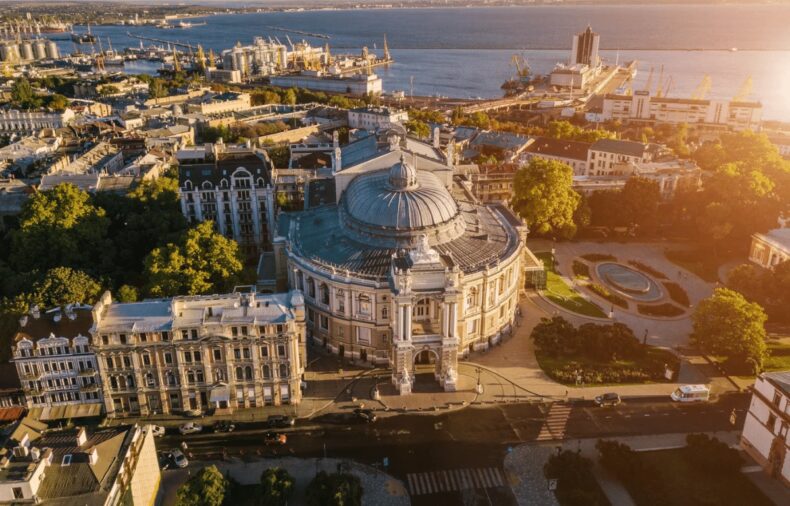The pearl of the black sea, Odesa, is now part of UNESCO’s list of endangered world heritage sites. In an effort to preserve Ukraine’s cultural monuments from being demolished by the persistent invasions from Russia, the United Nations Cultural Agency on Wednesday declared this historic Centre of Ukraine’s Black Sea portal to be included in the list of endangered world heritage sites.
Of the 21 member states, six approved the decision while 14 abstained. Russia voted against it.
This special position grants Odesa the ability to retrieve its reinforcements in the form of “financial and technical international aid.”
“As the war continues, this inscription reflects our collective determination to protect this city, which has always defended itself against global upheaval, from greater destruction,” UNESCO director-general Audrey Azoulay remarked in a statement.
The designation was mostly based on the cultural and theatrical contributions of the city, which have marked its significance in preserving this model for posterity.
Over 230 monuments have been destroyed in Ukraine since the Russian invasion on February 24, last year. Odesa was also part of the many bomb attacks unleashed by Russia, which argues that the port city was founded by a Russian empress and underlines this argument as a means for its territorial claim and, subsequently, armed aggression.
The Black Pearl in the Midst of Ruins

The decision leading to the designation of Odesa has greatly provoked the Russian Foreign Ministry, which has thoroughly condemned UNESCO for proceeding with the inscription, calling it “monstrous ignorance” on the part of the committee.
Russian Foreign Ministry spokeswoman Maria Zakharova expressed her disapproval, stating that the only threat posed towards Odesa is from “Ukraine’s nationalist regimes”—making reference to the dismantling of a statue of the Russian empress, Catherine the Great, by the city council last year.
In November 2022, the city council voted to remove the empress’s statue, which symbolizes the Russian oppression of Ukraine. Moscow alleged that this decision was “political” in nature.
A Russian representative on the UNESCO World Heritage Committee purposefully attempted to dissuade the parties from carrying out the decision and postpone it but was evidently unsuccessful in the attempt. She dismissed Ukraine’s application dossier, calling it “poor” in execution —further pointing out that the decision ceased to follow a proper official procedure and was only a part of hasty conduct.
“It was prepared hastily, without respecting the current high standards of UNESCO,” Russia’s foreign ministry condemned.
Russia’s Reckless Pursuit
In the midst of UNESCO’s declaration that is weighing against all enemy countries—to hold them to the obligation “to not bring deliberate destruction” to Odessa—Russia has openly violated this collective decision by striking Ukrainian power plants with missiles.

Ukraine Foreign Minister Dmytro Kuleba tweeted regarding the incident, publicly condemning Russia’s move and calling it “Putin’s response to UNESCO.”
Russia has been trying to shell various parts of the city countless times in hopes of conquering the transport hub, but the Ukrainian forces were long since prepared for defending the city, building sandbags to shield the monuments from shelling. But the fortification has its limits since Odesa has lost remnants of its historical era, surrendering the bits and pieces to bombings and missile attacks released by the Russian forces.
Optimism Prevails; Odesa Prevails

Countries such as France welcomed Odesa’s well-deserved inclusion in the list of world heritage sites. It praised UNESCO’s decision and further opined on “the exceptional value of this port city, its architecture, and its history for Ukraine and for humanity.”
Russian President Volodymyr Zelensky held similar commendations and tweeted; “Today Odesa got UNESCO protection. I’m grateful to partners who help protect our pearl from the Russian invaders’ attacks.”
Several other places in Ukraine have been added to the list of world heritage sites, consisting of Saint Sophia Cathedral located in Kyiv as well as the historic Centre of Lviv.
Ukraine’s president is optimistic about seizing the opportunity to fortify the country.
Yet the future is still precarious as to whether Ukraine’s black pearl could withstand the torrential currents of mass destruction let loose by the Russian forces.













